Comprehensive Analysis of Felix's Mental Health: A Nursing Case Study
VerifiedAdded on 2023/01/16
|9
|2699
|63
Report
AI Summary
This report presents a detailed analysis of a nursing case study focusing on Felix, a 20-year-old man experiencing mental health challenges. The case study highlights Felix's history of childhood abuse, alcohol addiction, and the resulting anxiety, depression, and suicidal thoughts. The report explores various treatment approaches, including person-centered care, cognitive behavioral therapy, psychotherapy, and medication (antidepressants and anti-anxiety medications). It emphasizes the crucial role of nurses in providing care, assessing the patient's needs, creating treatment plans, and coordinating with other healthcare professionals. The report also discusses the importance of community-based services, residential step-down facilities, and the application of the Mental Health Act 2014 to ensure Felix receives appropriate care and support. Furthermore, it addresses the impact of stigma, cultural beliefs, and the use of various therapeutic drugs in managing Felix's condition, concluding with the need for ongoing intervention and mental support for his recovery.

Nursing
Paraphrase This Document
Need a fresh take? Get an instant paraphrase of this document with our AI Paraphraser

Table of Contents
Introduction................................................................................................................................2
Main Context..............................................................................................................................2
Conclusion..................................................................................................................................5
References..................................................................................................................................6
1
Introduction................................................................................................................................2
Main Context..............................................................................................................................2
Conclusion..................................................................................................................................5
References..................................................................................................................................6
1
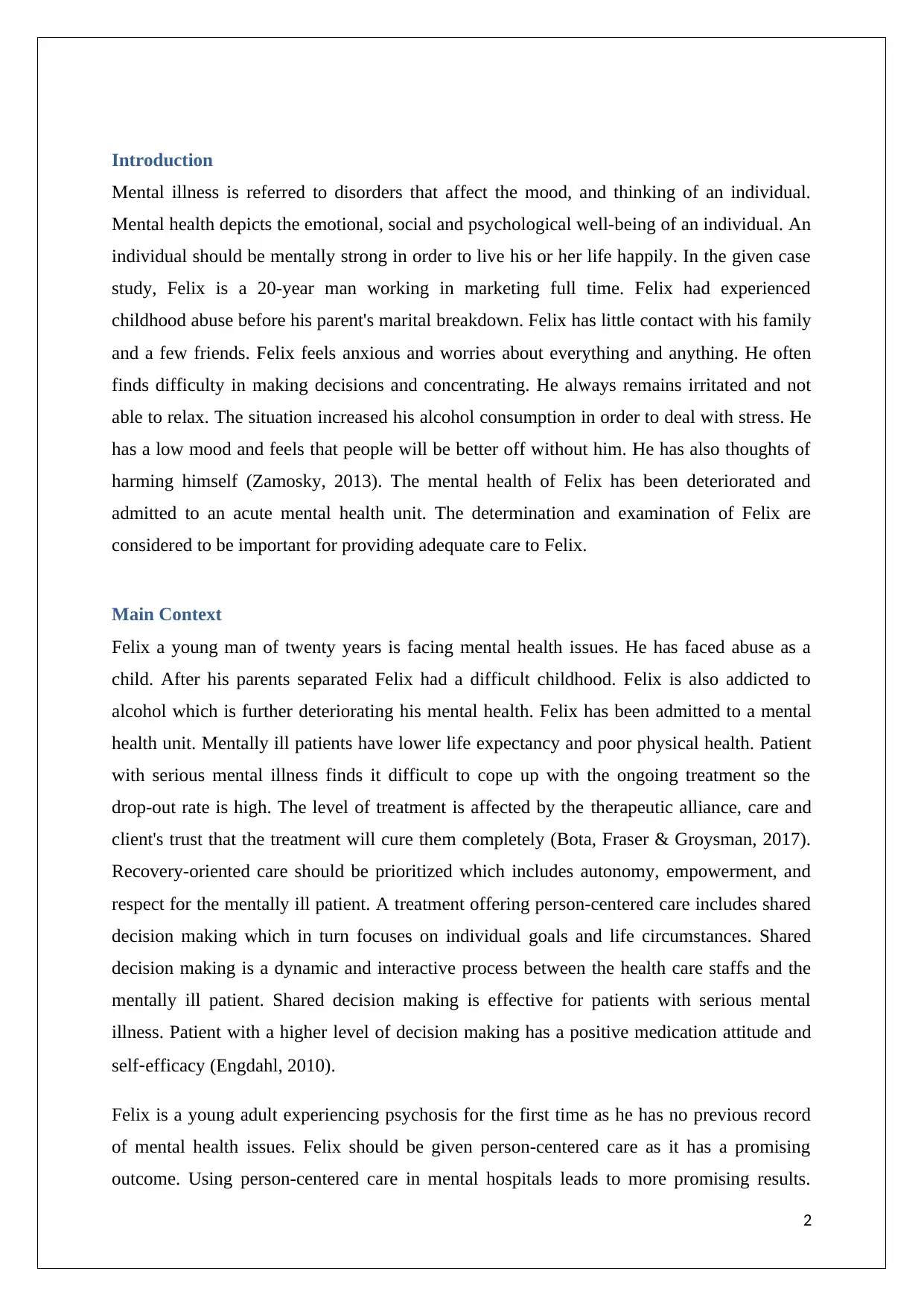
Introduction
Mental illness is referred to disorders that affect the mood, and thinking of an individual.
Mental health depicts the emotional, social and psychological well-being of an individual. An
individual should be mentally strong in order to live his or her life happily. In the given case
study, Felix is a 20-year man working in marketing full time. Felix had experienced
childhood abuse before his parent's marital breakdown. Felix has little contact with his family
and a few friends. Felix feels anxious and worries about everything and anything. He often
finds difficulty in making decisions and concentrating. He always remains irritated and not
able to relax. The situation increased his alcohol consumption in order to deal with stress. He
has a low mood and feels that people will be better off without him. He has also thoughts of
harming himself (Zamosky, 2013). The mental health of Felix has been deteriorated and
admitted to an acute mental health unit. The determination and examination of Felix are
considered to be important for providing adequate care to Felix.
Main Context
Felix a young man of twenty years is facing mental health issues. He has faced abuse as a
child. After his parents separated Felix had a difficult childhood. Felix is also addicted to
alcohol which is further deteriorating his mental health. Felix has been admitted to a mental
health unit. Mentally ill patients have lower life expectancy and poor physical health. Patient
with serious mental illness finds it difficult to cope up with the ongoing treatment so the
drop-out rate is high. The level of treatment is affected by the therapeutic alliance, care and
client's trust that the treatment will cure them completely (Bota, Fraser & Groysman, 2017).
Recovery-oriented care should be prioritized which includes autonomy, empowerment, and
respect for the mentally ill patient. A treatment offering person-centered care includes shared
decision making which in turn focuses on individual goals and life circumstances. Shared
decision making is a dynamic and interactive process between the health care staffs and the
mentally ill patient. Shared decision making is effective for patients with serious mental
illness. Patient with a higher level of decision making has a positive medication attitude and
self‐efficacy (Engdahl, 2010).
Felix is a young adult experiencing psychosis for the first time as he has no previous record
of mental health issues. Felix should be given person-centered care as it has a promising
outcome. Using person-centered care in mental hospitals leads to more promising results.
2
Mental illness is referred to disorders that affect the mood, and thinking of an individual.
Mental health depicts the emotional, social and psychological well-being of an individual. An
individual should be mentally strong in order to live his or her life happily. In the given case
study, Felix is a 20-year man working in marketing full time. Felix had experienced
childhood abuse before his parent's marital breakdown. Felix has little contact with his family
and a few friends. Felix feels anxious and worries about everything and anything. He often
finds difficulty in making decisions and concentrating. He always remains irritated and not
able to relax. The situation increased his alcohol consumption in order to deal with stress. He
has a low mood and feels that people will be better off without him. He has also thoughts of
harming himself (Zamosky, 2013). The mental health of Felix has been deteriorated and
admitted to an acute mental health unit. The determination and examination of Felix are
considered to be important for providing adequate care to Felix.
Main Context
Felix a young man of twenty years is facing mental health issues. He has faced abuse as a
child. After his parents separated Felix had a difficult childhood. Felix is also addicted to
alcohol which is further deteriorating his mental health. Felix has been admitted to a mental
health unit. Mentally ill patients have lower life expectancy and poor physical health. Patient
with serious mental illness finds it difficult to cope up with the ongoing treatment so the
drop-out rate is high. The level of treatment is affected by the therapeutic alliance, care and
client's trust that the treatment will cure them completely (Bota, Fraser & Groysman, 2017).
Recovery-oriented care should be prioritized which includes autonomy, empowerment, and
respect for the mentally ill patient. A treatment offering person-centered care includes shared
decision making which in turn focuses on individual goals and life circumstances. Shared
decision making is a dynamic and interactive process between the health care staffs and the
mentally ill patient. Shared decision making is effective for patients with serious mental
illness. Patient with a higher level of decision making has a positive medication attitude and
self‐efficacy (Engdahl, 2010).
Felix is a young adult experiencing psychosis for the first time as he has no previous record
of mental health issues. Felix should be given person-centered care as it has a promising
outcome. Using person-centered care in mental hospitals leads to more promising results.
2
⊘ This is a preview!⊘
Do you want full access?
Subscribe today to unlock all pages.

Trusted by 1+ million students worldwide
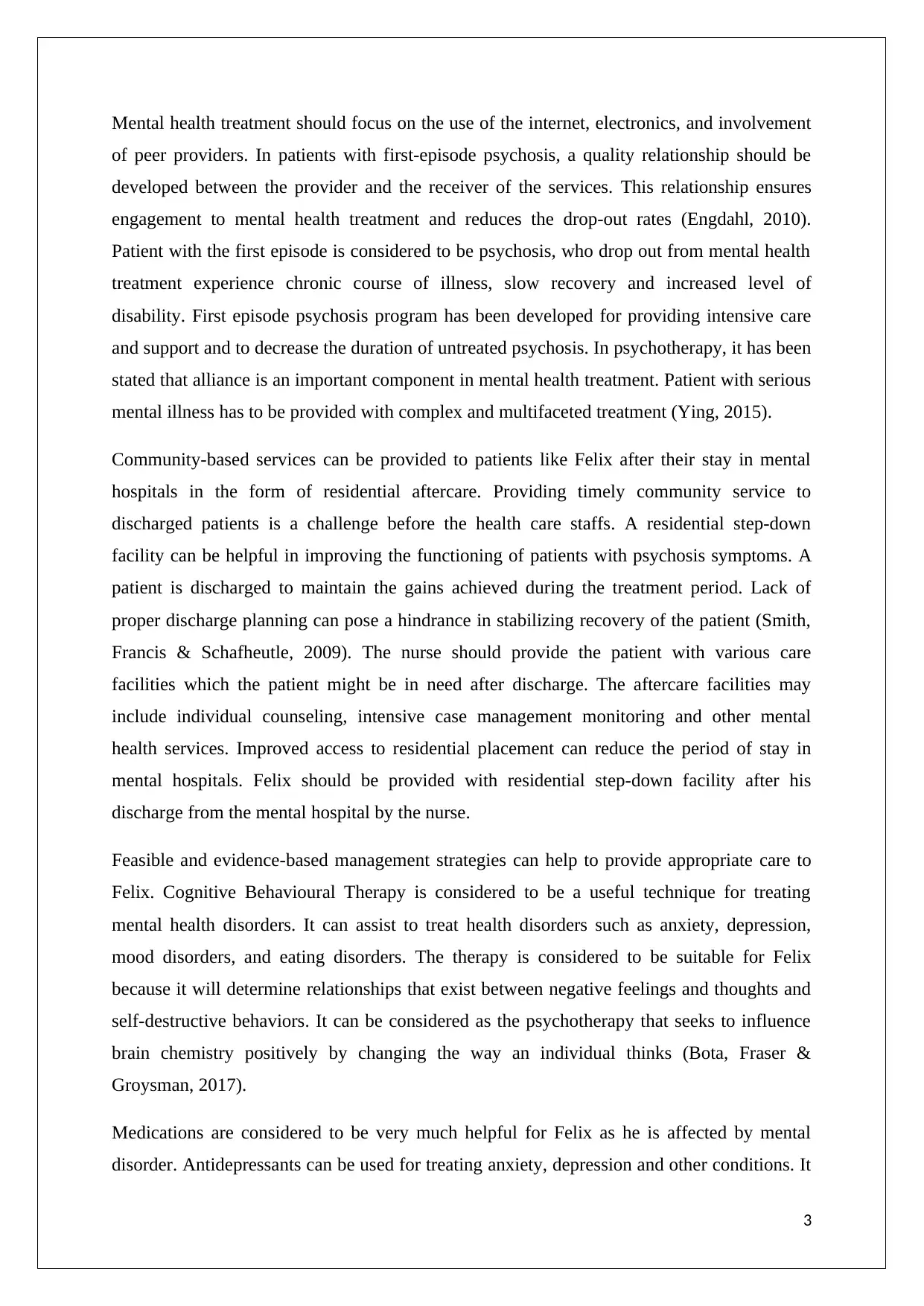
Mental health treatment should focus on the use of the internet, electronics, and involvement
of peer providers. In patients with first-episode psychosis, a quality relationship should be
developed between the provider and the receiver of the services. This relationship ensures
engagement to mental health treatment and reduces the drop-out rates (Engdahl, 2010).
Patient with the first episode is considered to be psychosis, who drop out from mental health
treatment experience chronic course of illness, slow recovery and increased level of
disability. First episode psychosis program has been developed for providing intensive care
and support and to decrease the duration of untreated psychosis. In psychotherapy, it has been
stated that alliance is an important component in mental health treatment. Patient with serious
mental illness has to be provided with complex and multifaceted treatment (Ying, 2015).
Community-based services can be provided to patients like Felix after their stay in mental
hospitals in the form of residential aftercare. Providing timely community service to
discharged patients is a challenge before the health care staffs. A residential step-down
facility can be helpful in improving the functioning of patients with psychosis symptoms. A
patient is discharged to maintain the gains achieved during the treatment period. Lack of
proper discharge planning can pose a hindrance in stabilizing recovery of the patient (Smith,
Francis & Schafheutle, 2009). The nurse should provide the patient with various care
facilities which the patient might be in need after discharge. The aftercare facilities may
include individual counseling, intensive case management monitoring and other mental
health services. Improved access to residential placement can reduce the period of stay in
mental hospitals. Felix should be provided with residential step-down facility after his
discharge from the mental hospital by the nurse.
Feasible and evidence-based management strategies can help to provide appropriate care to
Felix. Cognitive Behavioural Therapy is considered to be a useful technique for treating
mental health disorders. It can assist to treat health disorders such as anxiety, depression,
mood disorders, and eating disorders. The therapy is considered to be suitable for Felix
because it will determine relationships that exist between negative feelings and thoughts and
self-destructive behaviors. It can be considered as the psychotherapy that seeks to influence
brain chemistry positively by changing the way an individual thinks (Bota, Fraser &
Groysman, 2017).
Medications are considered to be very much helpful for Felix as he is affected by mental
disorder. Antidepressants can be used for treating anxiety, depression and other conditions. It
3
of peer providers. In patients with first-episode psychosis, a quality relationship should be
developed between the provider and the receiver of the services. This relationship ensures
engagement to mental health treatment and reduces the drop-out rates (Engdahl, 2010).
Patient with the first episode is considered to be psychosis, who drop out from mental health
treatment experience chronic course of illness, slow recovery and increased level of
disability. First episode psychosis program has been developed for providing intensive care
and support and to decrease the duration of untreated psychosis. In psychotherapy, it has been
stated that alliance is an important component in mental health treatment. Patient with serious
mental illness has to be provided with complex and multifaceted treatment (Ying, 2015).
Community-based services can be provided to patients like Felix after their stay in mental
hospitals in the form of residential aftercare. Providing timely community service to
discharged patients is a challenge before the health care staffs. A residential step-down
facility can be helpful in improving the functioning of patients with psychosis symptoms. A
patient is discharged to maintain the gains achieved during the treatment period. Lack of
proper discharge planning can pose a hindrance in stabilizing recovery of the patient (Smith,
Francis & Schafheutle, 2009). The nurse should provide the patient with various care
facilities which the patient might be in need after discharge. The aftercare facilities may
include individual counseling, intensive case management monitoring and other mental
health services. Improved access to residential placement can reduce the period of stay in
mental hospitals. Felix should be provided with residential step-down facility after his
discharge from the mental hospital by the nurse.
Feasible and evidence-based management strategies can help to provide appropriate care to
Felix. Cognitive Behavioural Therapy is considered to be a useful technique for treating
mental health disorders. It can assist to treat health disorders such as anxiety, depression,
mood disorders, and eating disorders. The therapy is considered to be suitable for Felix
because it will determine relationships that exist between negative feelings and thoughts and
self-destructive behaviors. It can be considered as the psychotherapy that seeks to influence
brain chemistry positively by changing the way an individual thinks (Bota, Fraser &
Groysman, 2017).
Medications are considered to be very much helpful for Felix as he is affected by mental
disorder. Antidepressants can be used for treating anxiety, depression and other conditions. It
3
Paraphrase This Document
Need a fresh take? Get an instant paraphrase of this document with our AI Paraphraser
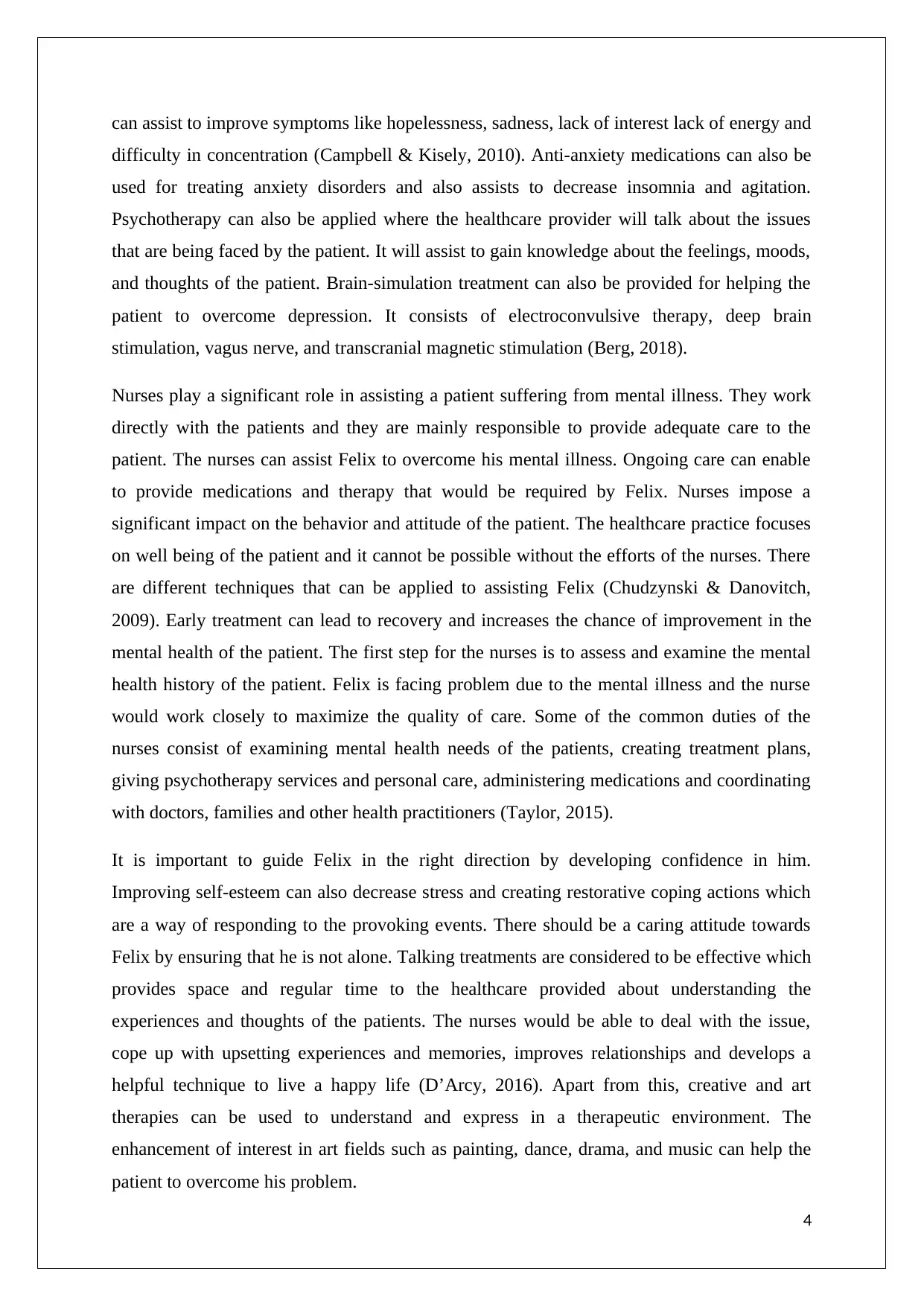
can assist to improve symptoms like hopelessness, sadness, lack of interest lack of energy and
difficulty in concentration (Campbell & Kisely, 2010). Anti-anxiety medications can also be
used for treating anxiety disorders and also assists to decrease insomnia and agitation.
Psychotherapy can also be applied where the healthcare provider will talk about the issues
that are being faced by the patient. It will assist to gain knowledge about the feelings, moods,
and thoughts of the patient. Brain-simulation treatment can also be provided for helping the
patient to overcome depression. It consists of electroconvulsive therapy, deep brain
stimulation, vagus nerve, and transcranial magnetic stimulation (Berg, 2018).
Nurses play a significant role in assisting a patient suffering from mental illness. They work
directly with the patients and they are mainly responsible to provide adequate care to the
patient. The nurses can assist Felix to overcome his mental illness. Ongoing care can enable
to provide medications and therapy that would be required by Felix. Nurses impose a
significant impact on the behavior and attitude of the patient. The healthcare practice focuses
on well being of the patient and it cannot be possible without the efforts of the nurses. There
are different techniques that can be applied to assisting Felix (Chudzynski & Danovitch,
2009). Early treatment can lead to recovery and increases the chance of improvement in the
mental health of the patient. The first step for the nurses is to assess and examine the mental
health history of the patient. Felix is facing problem due to the mental illness and the nurse
would work closely to maximize the quality of care. Some of the common duties of the
nurses consist of examining mental health needs of the patients, creating treatment plans,
giving psychotherapy services and personal care, administering medications and coordinating
with doctors, families and other health practitioners (Taylor, 2015).
It is important to guide Felix in the right direction by developing confidence in him.
Improving self-esteem can also decrease stress and creating restorative coping actions which
are a way of responding to the provoking events. There should be a caring attitude towards
Felix by ensuring that he is not alone. Talking treatments are considered to be effective which
provides space and regular time to the healthcare provided about understanding the
experiences and thoughts of the patients. The nurses would be able to deal with the issue,
cope up with upsetting experiences and memories, improves relationships and develops a
helpful technique to live a happy life (DʼArcy, 2016). Apart from this, creative and art
therapies can be used to understand and express in a therapeutic environment. The
enhancement of interest in art fields such as painting, dance, drama, and music can help the
patient to overcome his problem.
4
difficulty in concentration (Campbell & Kisely, 2010). Anti-anxiety medications can also be
used for treating anxiety disorders and also assists to decrease insomnia and agitation.
Psychotherapy can also be applied where the healthcare provider will talk about the issues
that are being faced by the patient. It will assist to gain knowledge about the feelings, moods,
and thoughts of the patient. Brain-simulation treatment can also be provided for helping the
patient to overcome depression. It consists of electroconvulsive therapy, deep brain
stimulation, vagus nerve, and transcranial magnetic stimulation (Berg, 2018).
Nurses play a significant role in assisting a patient suffering from mental illness. They work
directly with the patients and they are mainly responsible to provide adequate care to the
patient. The nurses can assist Felix to overcome his mental illness. Ongoing care can enable
to provide medications and therapy that would be required by Felix. Nurses impose a
significant impact on the behavior and attitude of the patient. The healthcare practice focuses
on well being of the patient and it cannot be possible without the efforts of the nurses. There
are different techniques that can be applied to assisting Felix (Chudzynski & Danovitch,
2009). Early treatment can lead to recovery and increases the chance of improvement in the
mental health of the patient. The first step for the nurses is to assess and examine the mental
health history of the patient. Felix is facing problem due to the mental illness and the nurse
would work closely to maximize the quality of care. Some of the common duties of the
nurses consist of examining mental health needs of the patients, creating treatment plans,
giving psychotherapy services and personal care, administering medications and coordinating
with doctors, families and other health practitioners (Taylor, 2015).
It is important to guide Felix in the right direction by developing confidence in him.
Improving self-esteem can also decrease stress and creating restorative coping actions which
are a way of responding to the provoking events. There should be a caring attitude towards
Felix by ensuring that he is not alone. Talking treatments are considered to be effective which
provides space and regular time to the healthcare provided about understanding the
experiences and thoughts of the patients. The nurses would be able to deal with the issue,
cope up with upsetting experiences and memories, improves relationships and develops a
helpful technique to live a happy life (DʼArcy, 2016). Apart from this, creative and art
therapies can be used to understand and express in a therapeutic environment. The
enhancement of interest in art fields such as painting, dance, drama, and music can help the
patient to overcome his problem.
4
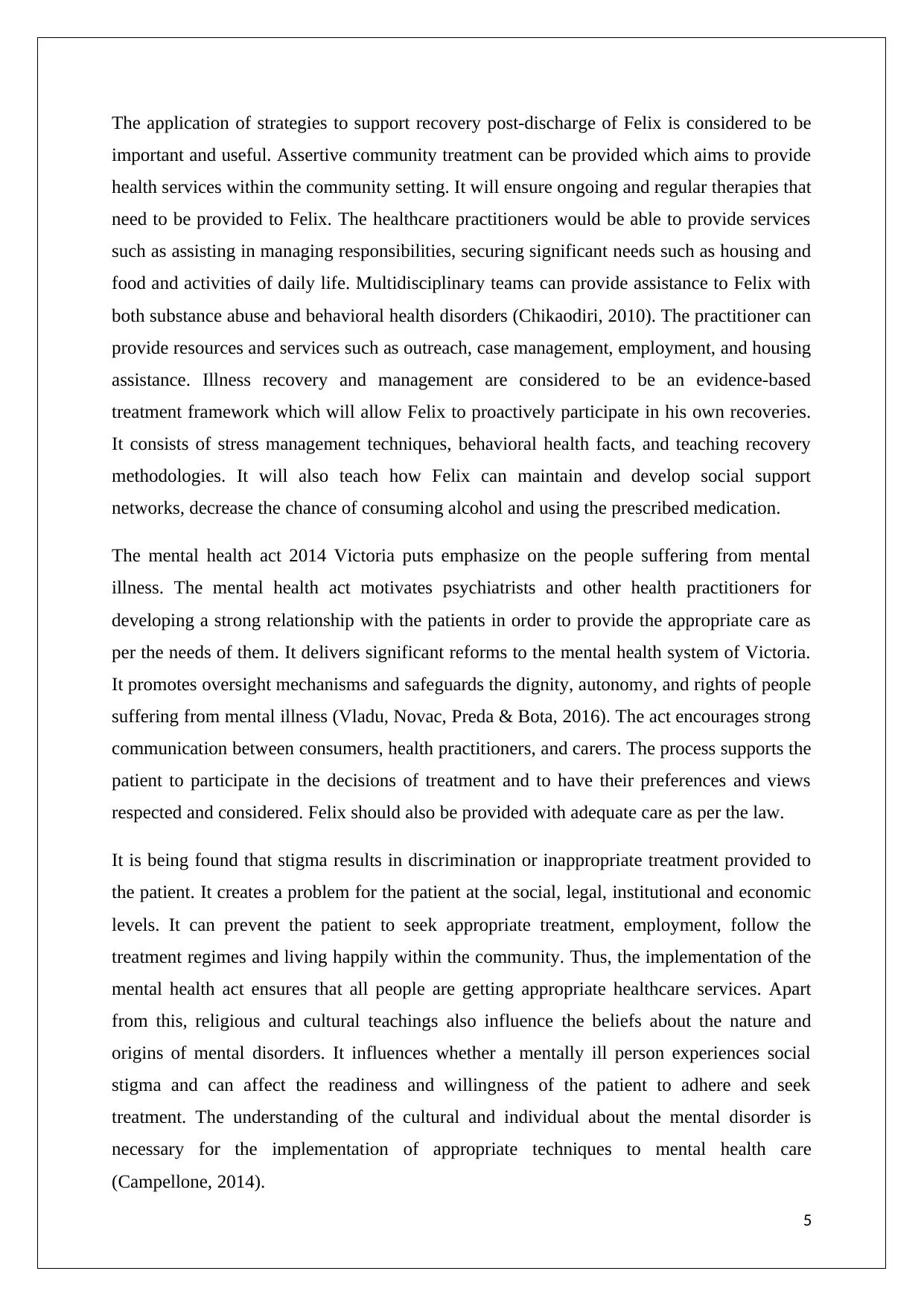
The application of strategies to support recovery post-discharge of Felix is considered to be
important and useful. Assertive community treatment can be provided which aims to provide
health services within the community setting. It will ensure ongoing and regular therapies that
need to be provided to Felix. The healthcare practitioners would be able to provide services
such as assisting in managing responsibilities, securing significant needs such as housing and
food and activities of daily life. Multidisciplinary teams can provide assistance to Felix with
both substance abuse and behavioral health disorders (Chikaodiri, 2010). The practitioner can
provide resources and services such as outreach, case management, employment, and housing
assistance. Illness recovery and management are considered to be an evidence-based
treatment framework which will allow Felix to proactively participate in his own recoveries.
It consists of stress management techniques, behavioral health facts, and teaching recovery
methodologies. It will also teach how Felix can maintain and develop social support
networks, decrease the chance of consuming alcohol and using the prescribed medication.
The mental health act 2014 Victoria puts emphasize on the people suffering from mental
illness. The mental health act motivates psychiatrists and other health practitioners for
developing a strong relationship with the patients in order to provide the appropriate care as
per the needs of them. It delivers significant reforms to the mental health system of Victoria.
It promotes oversight mechanisms and safeguards the dignity, autonomy, and rights of people
suffering from mental illness (Vladu, Novac, Preda & Bota, 2016). The act encourages strong
communication between consumers, health practitioners, and carers. The process supports the
patient to participate in the decisions of treatment and to have their preferences and views
respected and considered. Felix should also be provided with adequate care as per the law.
It is being found that stigma results in discrimination or inappropriate treatment provided to
the patient. It creates a problem for the patient at the social, legal, institutional and economic
levels. It can prevent the patient to seek appropriate treatment, employment, follow the
treatment regimes and living happily within the community. Thus, the implementation of the
mental health act ensures that all people are getting appropriate healthcare services. Apart
from this, religious and cultural teachings also influence the beliefs about the nature and
origins of mental disorders. It influences whether a mentally ill person experiences social
stigma and can affect the readiness and willingness of the patient to adhere and seek
treatment. The understanding of the cultural and individual about the mental disorder is
necessary for the implementation of appropriate techniques to mental health care
(Campellone, 2014).
5
important and useful. Assertive community treatment can be provided which aims to provide
health services within the community setting. It will ensure ongoing and regular therapies that
need to be provided to Felix. The healthcare practitioners would be able to provide services
such as assisting in managing responsibilities, securing significant needs such as housing and
food and activities of daily life. Multidisciplinary teams can provide assistance to Felix with
both substance abuse and behavioral health disorders (Chikaodiri, 2010). The practitioner can
provide resources and services such as outreach, case management, employment, and housing
assistance. Illness recovery and management are considered to be an evidence-based
treatment framework which will allow Felix to proactively participate in his own recoveries.
It consists of stress management techniques, behavioral health facts, and teaching recovery
methodologies. It will also teach how Felix can maintain and develop social support
networks, decrease the chance of consuming alcohol and using the prescribed medication.
The mental health act 2014 Victoria puts emphasize on the people suffering from mental
illness. The mental health act motivates psychiatrists and other health practitioners for
developing a strong relationship with the patients in order to provide the appropriate care as
per the needs of them. It delivers significant reforms to the mental health system of Victoria.
It promotes oversight mechanisms and safeguards the dignity, autonomy, and rights of people
suffering from mental illness (Vladu, Novac, Preda & Bota, 2016). The act encourages strong
communication between consumers, health practitioners, and carers. The process supports the
patient to participate in the decisions of treatment and to have their preferences and views
respected and considered. Felix should also be provided with adequate care as per the law.
It is being found that stigma results in discrimination or inappropriate treatment provided to
the patient. It creates a problem for the patient at the social, legal, institutional and economic
levels. It can prevent the patient to seek appropriate treatment, employment, follow the
treatment regimes and living happily within the community. Thus, the implementation of the
mental health act ensures that all people are getting appropriate healthcare services. Apart
from this, religious and cultural teachings also influence the beliefs about the nature and
origins of mental disorders. It influences whether a mentally ill person experiences social
stigma and can affect the readiness and willingness of the patient to adhere and seek
treatment. The understanding of the cultural and individual about the mental disorder is
necessary for the implementation of appropriate techniques to mental health care
(Campellone, 2014).
5
⊘ This is a preview!⊘
Do you want full access?
Subscribe today to unlock all pages.

Trusted by 1+ million students worldwide
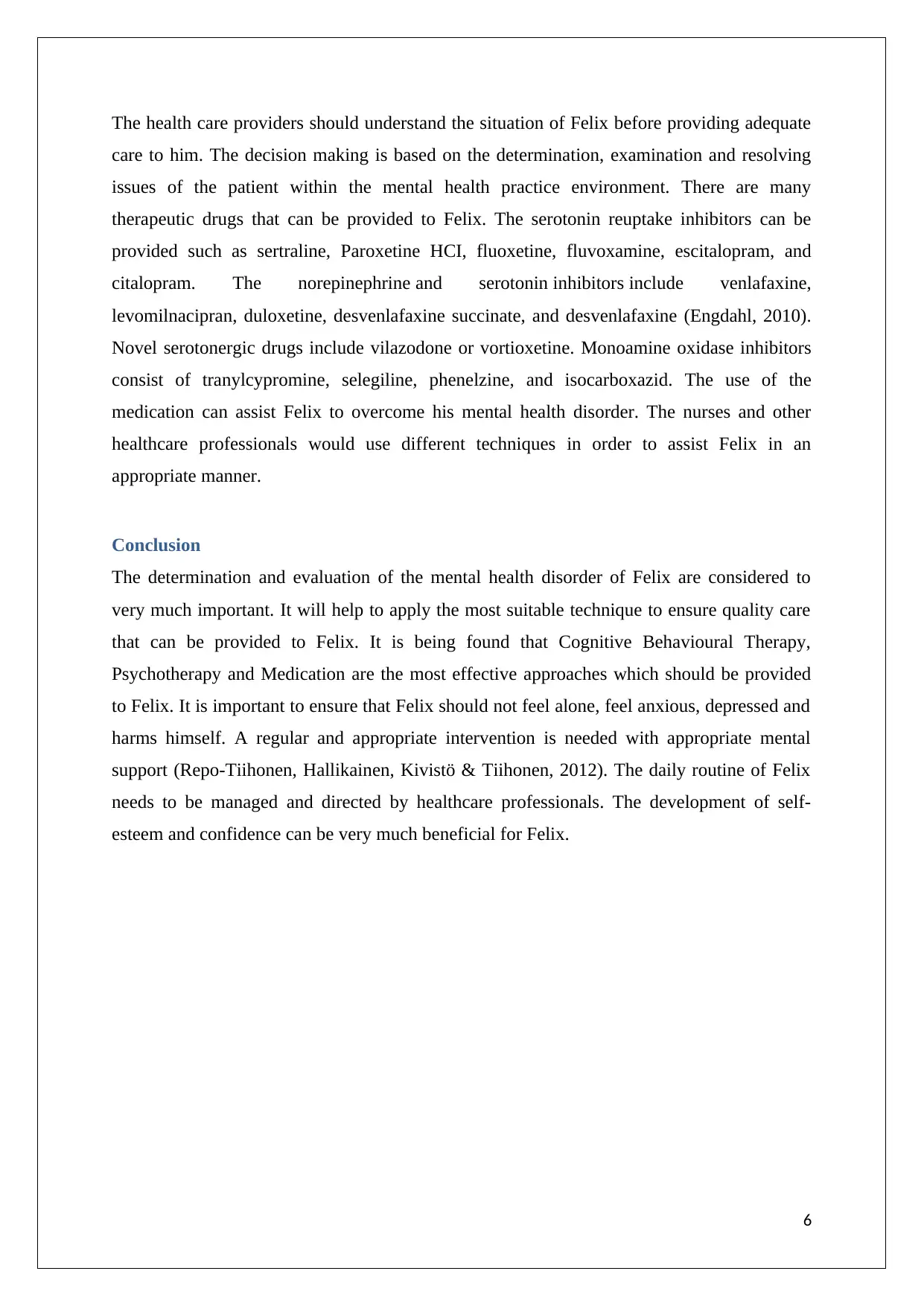
The health care providers should understand the situation of Felix before providing adequate
care to him. The decision making is based on the determination, examination and resolving
issues of the patient within the mental health practice environment. There are many
therapeutic drugs that can be provided to Felix. The serotonin reuptake inhibitors can be
provided such as sertraline, Paroxetine HCI, fluoxetine, fluvoxamine, escitalopram, and
citalopram. The norepinephrine and serotonin inhibitors include venlafaxine,
levomilnacipran, duloxetine, desvenlafaxine succinate, and desvenlafaxine (Engdahl, 2010).
Novel serotonergic drugs include vilazodone or vortioxetine. Monoamine oxidase inhibitors
consist of tranylcypromine, selegiline, phenelzine, and isocarboxazid. The use of the
medication can assist Felix to overcome his mental health disorder. The nurses and other
healthcare professionals would use different techniques in order to assist Felix in an
appropriate manner.
Conclusion
The determination and evaluation of the mental health disorder of Felix are considered to
very much important. It will help to apply the most suitable technique to ensure quality care
that can be provided to Felix. It is being found that Cognitive Behavioural Therapy,
Psychotherapy and Medication are the most effective approaches which should be provided
to Felix. It is important to ensure that Felix should not feel alone, feel anxious, depressed and
harms himself. A regular and appropriate intervention is needed with appropriate mental
support (Repo-Tiihonen, Hallikainen, Kivistö & Tiihonen, 2012). The daily routine of Felix
needs to be managed and directed by healthcare professionals. The development of self-
esteem and confidence can be very much beneficial for Felix.
6
care to him. The decision making is based on the determination, examination and resolving
issues of the patient within the mental health practice environment. There are many
therapeutic drugs that can be provided to Felix. The serotonin reuptake inhibitors can be
provided such as sertraline, Paroxetine HCI, fluoxetine, fluvoxamine, escitalopram, and
citalopram. The norepinephrine and serotonin inhibitors include venlafaxine,
levomilnacipran, duloxetine, desvenlafaxine succinate, and desvenlafaxine (Engdahl, 2010).
Novel serotonergic drugs include vilazodone or vortioxetine. Monoamine oxidase inhibitors
consist of tranylcypromine, selegiline, phenelzine, and isocarboxazid. The use of the
medication can assist Felix to overcome his mental health disorder. The nurses and other
healthcare professionals would use different techniques in order to assist Felix in an
appropriate manner.
Conclusion
The determination and evaluation of the mental health disorder of Felix are considered to
very much important. It will help to apply the most suitable technique to ensure quality care
that can be provided to Felix. It is being found that Cognitive Behavioural Therapy,
Psychotherapy and Medication are the most effective approaches which should be provided
to Felix. It is important to ensure that Felix should not feel alone, feel anxious, depressed and
harms himself. A regular and appropriate intervention is needed with appropriate mental
support (Repo-Tiihonen, Hallikainen, Kivistö & Tiihonen, 2012). The daily routine of Felix
needs to be managed and directed by healthcare professionals. The development of self-
esteem and confidence can be very much beneficial for Felix.
6
Paraphrase This Document
Need a fresh take? Get an instant paraphrase of this document with our AI Paraphraser
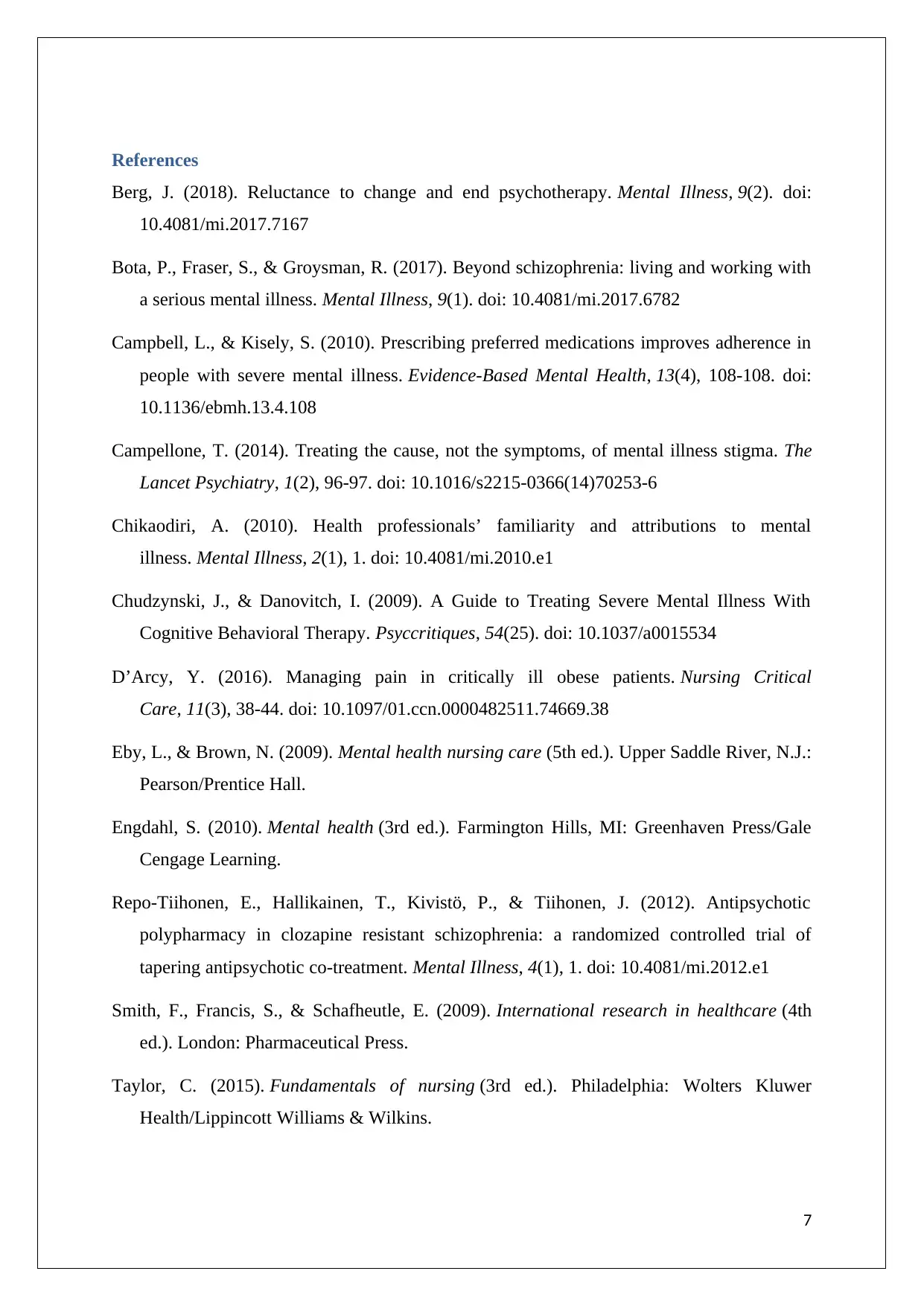
References
Berg, J. (2018). Reluctance to change and end psychotherapy. Mental Illness, 9(2). doi:
10.4081/mi.2017.7167
Bota, P., Fraser, S., & Groysman, R. (2017). Beyond schizophrenia: living and working with
a serious mental illness. Mental Illness, 9(1). doi: 10.4081/mi.2017.6782
Campbell, L., & Kisely, S. (2010). Prescribing preferred medications improves adherence in
people with severe mental illness. Evidence-Based Mental Health, 13(4), 108-108. doi:
10.1136/ebmh.13.4.108
Campellone, T. (2014). Treating the cause, not the symptoms, of mental illness stigma. The
Lancet Psychiatry, 1(2), 96-97. doi: 10.1016/s2215-0366(14)70253-6
Chikaodiri, A. (2010). Health professionals’ familiarity and attributions to mental
illness. Mental Illness, 2(1), 1. doi: 10.4081/mi.2010.e1
Chudzynski, J., & Danovitch, I. (2009). A Guide to Treating Severe Mental Illness With
Cognitive Behavioral Therapy. Psyccritiques, 54(25). doi: 10.1037/a0015534
DʼArcy, Y. (2016). Managing pain in critically ill obese patients. Nursing Critical
Care, 11(3), 38-44. doi: 10.1097/01.ccn.0000482511.74669.38
Eby, L., & Brown, N. (2009). Mental health nursing care (5th ed.). Upper Saddle River, N.J.:
Pearson/Prentice Hall.
Engdahl, S. (2010). Mental health (3rd ed.). Farmington Hills, MI: Greenhaven Press/Gale
Cengage Learning.
Repo-Tiihonen, E., Hallikainen, T., Kivistö, P., & Tiihonen, J. (2012). Antipsychotic
polypharmacy in clozapine resistant schizophrenia: a randomized controlled trial of
tapering antipsychotic co-treatment. Mental Illness, 4(1), 1. doi: 10.4081/mi.2012.e1
Smith, F., Francis, S., & Schafheutle, E. (2009). International research in healthcare (4th
ed.). London: Pharmaceutical Press.
Taylor, C. (2015). Fundamentals of nursing (3rd ed.). Philadelphia: Wolters Kluwer
Health/Lippincott Williams & Wilkins.
7
Berg, J. (2018). Reluctance to change and end psychotherapy. Mental Illness, 9(2). doi:
10.4081/mi.2017.7167
Bota, P., Fraser, S., & Groysman, R. (2017). Beyond schizophrenia: living and working with
a serious mental illness. Mental Illness, 9(1). doi: 10.4081/mi.2017.6782
Campbell, L., & Kisely, S. (2010). Prescribing preferred medications improves adherence in
people with severe mental illness. Evidence-Based Mental Health, 13(4), 108-108. doi:
10.1136/ebmh.13.4.108
Campellone, T. (2014). Treating the cause, not the symptoms, of mental illness stigma. The
Lancet Psychiatry, 1(2), 96-97. doi: 10.1016/s2215-0366(14)70253-6
Chikaodiri, A. (2010). Health professionals’ familiarity and attributions to mental
illness. Mental Illness, 2(1), 1. doi: 10.4081/mi.2010.e1
Chudzynski, J., & Danovitch, I. (2009). A Guide to Treating Severe Mental Illness With
Cognitive Behavioral Therapy. Psyccritiques, 54(25). doi: 10.1037/a0015534
DʼArcy, Y. (2016). Managing pain in critically ill obese patients. Nursing Critical
Care, 11(3), 38-44. doi: 10.1097/01.ccn.0000482511.74669.38
Eby, L., & Brown, N. (2009). Mental health nursing care (5th ed.). Upper Saddle River, N.J.:
Pearson/Prentice Hall.
Engdahl, S. (2010). Mental health (3rd ed.). Farmington Hills, MI: Greenhaven Press/Gale
Cengage Learning.
Repo-Tiihonen, E., Hallikainen, T., Kivistö, P., & Tiihonen, J. (2012). Antipsychotic
polypharmacy in clozapine resistant schizophrenia: a randomized controlled trial of
tapering antipsychotic co-treatment. Mental Illness, 4(1), 1. doi: 10.4081/mi.2012.e1
Smith, F., Francis, S., & Schafheutle, E. (2009). International research in healthcare (4th
ed.). London: Pharmaceutical Press.
Taylor, C. (2015). Fundamentals of nursing (3rd ed.). Philadelphia: Wolters Kluwer
Health/Lippincott Williams & Wilkins.
7

Vladu, C., Novac, A., Preda, A., & Bota, R. (2016). No health without mental health. Mental
Illness, 8(2). doi: 10.4081/mi.2016.6609
Ying, S. (2015). Research on the Effectiveness of Exercise Therapy Treating Mental
Illness. The Open Cybernetics & Systemics Journal, 9(1), 1539-1543. doi:
10.2174/1874110x01509011539
Zamosky, L. (2013). Healthcare. Sydney: Apress.
8
Illness, 8(2). doi: 10.4081/mi.2016.6609
Ying, S. (2015). Research on the Effectiveness of Exercise Therapy Treating Mental
Illness. The Open Cybernetics & Systemics Journal, 9(1), 1539-1543. doi:
10.2174/1874110x01509011539
Zamosky, L. (2013). Healthcare. Sydney: Apress.
8
⊘ This is a preview!⊘
Do you want full access?
Subscribe today to unlock all pages.

Trusted by 1+ million students worldwide
1 out of 9
Related Documents
Your All-in-One AI-Powered Toolkit for Academic Success.
+13062052269
info@desklib.com
Available 24*7 on WhatsApp / Email
![[object Object]](/_next/static/media/star-bottom.7253800d.svg)
Unlock your academic potential
Copyright © 2020–2026 A2Z Services. All Rights Reserved. Developed and managed by ZUCOL.





